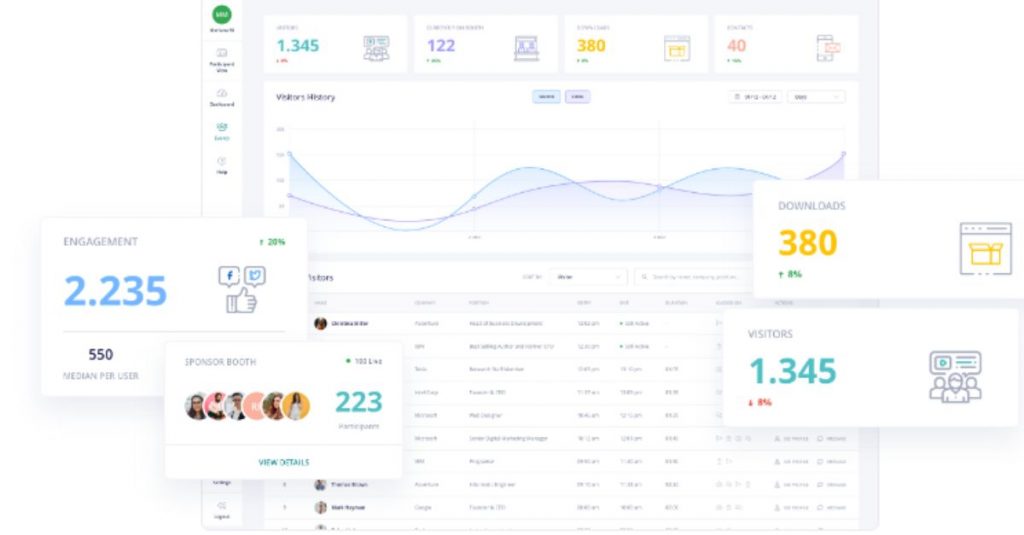Virtual vs Hybrid Events
When comparing virtual vs hybrid events, it’s important to understand what virtual and hybrid events are. Understanding these types of events allows you to judge which will suit your organization’s needs better when planning and executing your next event.
What is a Virtual Event?
A virtual event is an event that takes place exclusively online. There are no in-person interactions at a physical location. Instead, all interactions take place online between the participants of the virtual event.
If you’ve attended a webinar or an online meeting with a colleague, you’ve been part of a virtual event. Of course, the virtual event platform that you choose will determine just how engaging the virtual event will be for the attendees. Seeing virtual event ideas become a reality can also be very exciting for the host of a virtual event.
Virtual vs Hybrid Events: Benefits of Virtual Events
There are too many benefits of virtual events to mention in this article. So instead, we’ll mention a couple of the most important benefits that can be game-changers if you’re considering hosting an event for your organization.
Cost
Budgetary constraints are always a factor to consider when planning an event. However, considering the number of attendees, a virtual event costs a fraction of what an in-person event would cost.
Using a world-class virtual event platform such as SCOOCS to host a virtual event experience is far more cost-effective than hosting an in-person event and paying for an event venue, catering costs, event staff, audiovisual costs, security, printing and various other costs associated with an in-person event.
A virtual event is hands down the most cost-effective form of event that you could host.
Number of Attendees
The number of attendees that you can host at a virtual event is almost limitless. Virtual events are not limited by the size of an event venue. They also eliminate certain constraints which prevent attendees from attending in-person events, such as the financial cost of travel and accommodation, Covid-19 social distancing protocols, or time away from family. If you want to scale your event, a virtual event is the way to go.
Understand Your Audience Better
If you use a virtual event platform such as SCOOCS, then the data that you will receive from your attendees will be truly mind-blowing.
The importance of data cannot be understated. The data you receive from your attendees allows you to make subtle changes while the event is taking place to increase the enjoyment of the event experience.
Analyzing the data post-event also allows you to improve future events, change your marketing to cater to your target market’s needs and wants, and even change how you deal with your ideal customer going forward.

What is a Hybrid Event?
A hybrid event has a number of the event participants attending a venue in person and the rest attending virtually using their desktop or another device. It’s important to note that a quality hybrid events platform such as SCOOCS will allow all attendees to feel like they are part of the event.
Allowing all attendees, in-person and virtual, to engage fully with all event participants is very important to make the hybrid event experience successful.
Virtual vs Hybrid Events: Benefits of Hybrid Events
Hybrid events combine all the best parts of in-person and virtual events into one event, so the benefits are clear to see. We’ll mention just 2 of the many benefits of hybrid events.
Accommodate all Attendees
The beauty of Hybrid events is the fact that it has attendees attending in-person and others virtually. The fact that you can give your attendees the choice of whether they want to travel to the event venue to attend your event or participate in your event online is attractive. Some people want in-person interactions, while others don’t. Covid-19 has also meant that some might be unwilling to travel and be close to others for fear of potential health risks. Hybrid events can please all views and preferences.
Flexibility
Covid-19 has wreaked havoc in the events industry since early 2020. Governments imposing restrictions at very short notice has resulted in many in-person events being canceled at the last minute. However, if you’re hosting a Hybrid event, it’s relatively easy to allow in-person attendees to switch to the virtual event aspect of your event.
Conclusion
When deciding on virtual vs hybrid events for your organization, it’s important to assess what goal you are trying to achieve by hosting the event and which type is, therefore, the most appropriate.
If you want to learn more about hosting a virtual or a hybrid event, feel free to book a demo with our amazing SCOOCS team.



